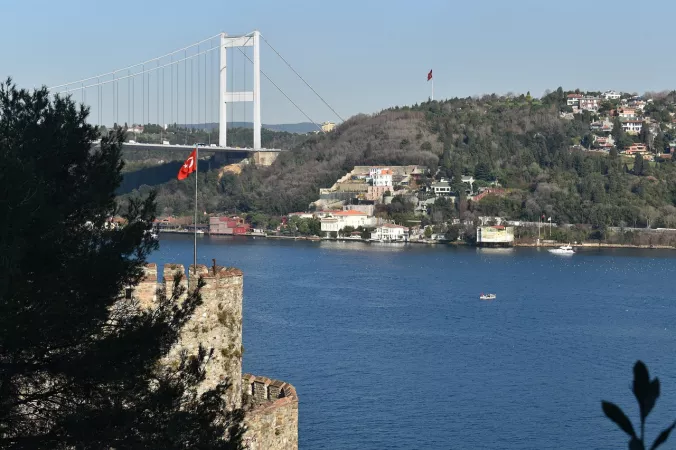Rumeli Fortress Travel Guide
Rumeli Fortress, also known as Rumelihisarı, is a historical landmark located in Istanbul, Turkey. Built in the 15th century by the Ottoman Sultan Mehmed the Conqueror, this fortress holds great significance in the history of the region. Strategically positioned on a hill overlooking the Bosphorus Strait, Rumeli Fortress played a crucial role in the conquest of Constantinople. Today, it stands as a symbol of the Ottoman Empire's power and is a popular tourist attraction in Istanbul.Top Attractions in Rumeli Fortress
- Explore the well-preserved fortress walls and towers
- Enjoy panoramic views of the Bosphorus and the city from the fortress
- Visit the Museum of the History of Science and Technology in Islam located within the fortress
- Attend cultural events and concerts held at Rumeli Fortress
Rumeli Fortress is Famous for
Its strategic location and historical significance as a key fortress during the Ottoman conquest of Constantinople.Top Attractions in Rumeli Fortress
- Walking along the fortress walls and enjoying the stunning views
- Exploring the Museum of the History of Science and Technology in Islam
- Attending events and concerts in the unique setting of the fortress
What's Great about Travelling to Rumeli Fortress?
- History enthusiasts will appreciate the rich historical significance of the fortress
- Photographers will find plenty of opportunities to capture breathtaking views
What's Not So Great about Travelling to Rumeli Fortress?
- Those with mobility issues may find the steep terrain challenging to navigate
- Visitors looking for bustling nightlife may find the fortress area quieter in the evenings
Travel Tips for Rumeli Fortress
- Foreign visitors may need a visa to enter Turkey, so check the requirements in advance
- Public transportation options are available to reach the fortress, including buses and ferries
- Be mindful of your belongings and follow safety guidelines while exploring the fortress
Important Rumeli Fortress trip information
- Ideal Duration: A few hours to explore the fortress and enjoy the views
- Best Time to Visit: Spring and fall for pleasant weather
- Nearby Airports and Railway Stations: Istanbul Airport and Sirkeci Railway Station
FAQ's on Rumeli Fortress
Q1: What is the best time to visit Rumeli Fortress?
The best time to visit Rumeli Fortress is during the spring and fall months when the weather is mild and perfect for exploring the historical site. Summer can be crowded with tourists, while winter may bring colder temperatures. Consider visiting during events like the Istanbul Jazz Festival for a unique experience.
Q2: Do I need a visa to travel to Rumeli Fortress?
Rumeli Fortress is located in Istanbul, Turkey. Most visitors to Turkey, including those visiting Istanbul, need to obtain an e-Visa before their arrival. However, some countries are exempt from visa requirements for short stays. Check the official Turkish e-Visa website for the most up-to-date information on visa requirements.
Q3: What are the must-visit attractions in Rumeli Fortress?
The top attractions in Rumeli Fortress include the impressive fortress walls, the Museum of the History of Science and Technology in Islam, and the stunning views of the Bosphorus. Don't miss the open-air concerts and events that are sometimes held within the fortress grounds, offering a unique cultural experience.
Q4: Is Rumeli Fortress a safe place to travel?
Rumeli Fortress is a popular tourist destination and generally considered safe. However, like any travel destination, it's important to be cautious of pickpocketing in crowded areas. Avoid isolated areas at night and be aware of your surroundings. Follow basic safety precautions and you should have a safe and enjoyable visit.
Q5: What is the local currency in Rumeli Fortress and can I use credit cards?
The local currency in Turkey is the Turkish Lira. Credit cards are widely accepted in major establishments in Istanbul, including Rumeli Fortress. However, it's recommended to carry some cash for smaller purchases and in case you visit places that may not accept cards. ATMs are also available for currency exchange.
Q6: What is the local cuisine like in Rumeli Fortress?
Turkish cuisine is diverse and flavorful, offering dishes like kebabs, mezes, baklava, and Turkish delight. Don't miss trying traditional dishes like köfte (meatballs) and gözleme (stuffed flatbread). For those with dietary restrictions, vegetarian options are available, and it's common to find dishes made with fresh ingredients like vegetables, fruits, and herbs.
Q7: What transportation options are available in Rumeli Fortress?
Getting to Rumeli Fortress is easy with various transportation options in Istanbul. You can take a bus, taxi, or use the efficient public transportation system, including trams and ferries. Consider walking or cycling to the fortress for a scenic route along the Bosphorus. Car rentals are also available for those who prefer to drive.
Q8: Are there any cultural norms or etiquette I should be aware of when visiting Rumeli Fortress?
When visiting Rumeli Fortress and Istanbul, it's important to respect local customs and traditions. Dress modestly when visiting religious sites, such as mosques. Remove your shoes before entering someone's home. Greet people with a handshake and maintain eye contact during conversations. It's customary to say "please" (lütfen) and "thank you" (teşekkür ederim) in Turkish. Embrace the warm hospitality of the locals for a memorable experience.
Q9: I am a travel agent. How can I buy travel leads of Rumeli Fortress?
Register yourself as a travel agent at agents.tripclap.com and then you can buy travel leads to Rumeli Fortress once your account is approved. For more details contact our support team at +91-8069186564 or support@tripclap.com

